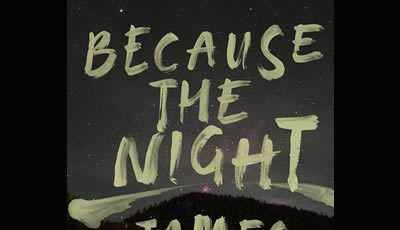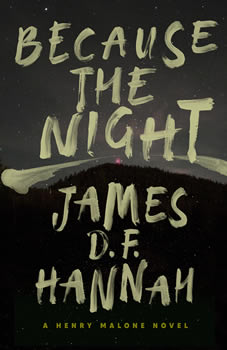

Crime Fiction Because the Night by James D.F. Hannah
 Backed with campaign funds from the owner of the local strip club, ex-state trooper and recovering alcoholic Henry Malone’s running for sheriff. But because he can’t say no a bad idea, he also agrees to look for a pregnant woman’s missing ex-on boyfriend. With his well-armed AA sponsor Woody in tow, Henry’s search for the boyfriend soon connects with a homicide investigation run by Lt. Jackie Hall–probably the last cop in West Virginia who still likes Henry.
Backed with campaign funds from the owner of the local strip club, ex-state trooper and recovering alcoholic Henry Malone’s running for sheriff. But because he can’t say no a bad idea, he also agrees to look for a pregnant woman’s missing ex-on boyfriend. With his well-armed AA sponsor Woody in tow, Henry’s search for the boyfriend soon connects with a homicide investigation run by Lt. Jackie Hall–probably the last cop in West Virginia who still likes Henry.
A violent confrontation leaves Jackie near-death and Henry determined to find justice. Except vengeance isn’t simple for Henry, especially when an old enemy appears out of nowhere, more bodies appear, and a series of betrayals and double crosses that climax with a morning assault on a farm house that pits Henry and Woody against a deadly band of criminals with nothing to lose.
TheBigThrill had a quick chat with award-winning author James D.F. Hannah about the latest installment in his Henry Malone series, BECAUSE THE NIGHT:
Which took shape first: plot, character, or setting?
I am always about character first. Six books in, I have a very good idea about who Henry Malone is, as well as Woody and the people who surround him. The key then is to surround him with other interesting individuals, and a challenge. Henry isn’t someone who can get too relaxed or too comfortable. Each book has to push him a little further in some direction—forwards or backwards—so there’s a deeper understanding of who he is. Joseph Wambaugh has the wonderful quote about how a good procedural is more about how the case works on the cops than how the cops work on the case. That’s true for Henry, who’s rebuilding the life he worked very hard to pull apart. When you write a series and your protagonist stops growing and changing, you should probably start writing something else.
What do you hope readers will take away from this book?
The Malone books are entertainment. You should be able to escape for a few hours, enjoy some snark and violence and appreciate the journey of the characters, while also getting a different perspective of Appalachian life.
What attracts you to this book’s genre?
Someone once said Westerns are the greatest genre, that you can tell any type of story in that format. I’d argue you could say the same about the PI novel, which in its best form offers you a ground-level view and a deeper exploration into a world. PI novels are a wonderful way to explore class structure, social issues, race—any ill or issue facing the world—because the PI is also the usurper of the social norm. The police procedural is about the cops coming in and reaffirming the social norm, whereas the PI is almost always an outsider, and he/she/they invariably upset that norm.
What was the biggest challenge this book presented? What about the biggest opportunity?
The biggest challenge was writing during a pandemic. I started on some version of this book in 2019, not long after the previous Malone novel, BEHIND THE WALL OF SLEEP, came out. Then the pandemic hit in 2020, the entire world went on sideways, it felt impossible to focus on writing about Henry when everything else seemed so unsure. I probably trashed more than 250K words in four or five different iterations of a Malone novel before I found the right headspace and the right story sometime in 2022. Once that happened, the writing came together naturally.
The biggest opportunity was to keep pushing Henry outside his comfort zones. To write what starts out as a PI novel and really becomes something of a revenge novel. Plus, I got to include several characters I’d introduced in previous books and offer a little bit of closure on their stories.
How does this book make a contribution to the genre?
I hope it shows you can have an unconventional—and sometimes unlikeable—protagonist, in an unexpected setting, and still delivery a story of growth and change. I’m a huge fan of Matt Coyle, because he always pushes his protagonist, Rick Cahill, into harder and more difficult situations, and each new book finds him a little worse for wear from the last book. But that makes Rick a more compelling character, and it’s a credit to Matt’s strengths as a writer.
Without spoilers, are there any genre conventions you wanted to upend or challenge with this book?
I never like it when the protagonist is the smartest, toughest one in the room. Spenser, Jack Reacher, those characters who seem to win every fight and always know the right thing to say—or in the case of Reacher, notably say nothing. Henry Malone is never the toughest guy, and in spite of his tendency to want to give up, Henry keeps fighting, and even when he loses, he doesn’t quit.
Can you tell us about your book that we won’t find in the jacket copy or the PR material?
Relationships that Henry once thought he could trust aren’t what he thought they were. He deals with a variety of betrayals and double crosses throughout the book, then has to put his life in the hands of the last person on earth he should trust.
Was there anything new you discovered, or surprised you, as you wrote this book?
When I figured out what story Henry needed this time around, it was joy coming back to the page every day. Henry’s voice is very much my own voice, unfiltered and amped up 30 percent, and I was happy he could still shock and surprise me.
What authors or books have influenced your career as a writer, and why?
I was very much a PI reader growing up, so there are all the obvious influences: Robert P. Parker (the books take place in Parker County for a reason), Lawrence Block, Loren Estleman, Marcia Muller, Sue Grafton. In particular, books like CEREMONY and EARLY AUTUMN by Parker, or SHACKLES by Bill Pronzini, showed me early on how far you could stretch the format, how hard you could push the characters, how deeply you could explore various issues. Now it’s writers such as S.A. Cosby, Kelly J. Ford, and Attica Locke, whose works reflect regional and social concerns, exploring larger issues in rural communities—what’s considered “the heartland of America.” They write crime novels that are also social novels, and I aim in some small way to do the same with Henry Malone and southern West Virginia.
What keeps you writing about Appalachia?
The truth is, it was my home for most of my life. I never lived outside of that mountain range for more than 40 years, and I think there’s an infinity of stories there to be told. Even when I’m not writing about Henry, I’m almost always writing about these small towns that dot the land I grew up in. And while I haven’t lived in the area in years now, it remains very much a piece of my heart and a place I call home.
James D.F. Hannah is the Shamus Award-winning author of the Henry Malone series, including the novels Behind the Wall of Sleep and She Talks to Angels. His story “No Man’s Land” was included in Best American Mystery and Suspense 2022, edited by Steph Cha and Jess Walter. His short fiction has appeared in Rock and a Hard Place, Shotgun Honey, The Anthology of Appalachian Writers, Trouble No More, Only the Good Die Young: Crime Fiction Inspired by the Songs of Billy Joel, Under the Thumb: Stories of Police Oppression, and Playing Games, edited by Lawrence Block.
To learn more about the author and his work, please visit his website.
- LAST GIRL MISSING with K.L. Murphy - July 25, 2024
- CHILD OF DUST with Yigal Zur - July 25, 2024
- THE RAVENWOOD CONSPIRACY with Michael Siverling - July 19, 2024

